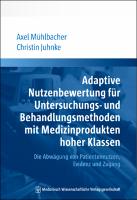Adaptive Nutzenbewertung für Untersuchungs- und Behandlungsmethoden mit Medizinprodukten hoher Klassen
Die Abwägung von Patientennutzen, Evidenz und Zugang
| dc.contributor.author | Mühlbacher, Axel | |
| dc.contributor.author | Juhnke, Christin | |
| dc.date.accessioned | 2020-06-17T14:18:57Z | |
| dc.date.available | 2020-06-17T14:18:57Z | |
| dc.date.issued | 2016 | |
| dc.identifier | ONIX_20200617_9783954664597_41 | |
| dc.identifier | ONIX_20200617_9783954664597_41 | |
| dc.identifier | OCN: 1163812708 | |
| dc.identifier.uri | http://library.oapen.org/handle/20.500.12657/39700 | |
| dc.language | German | |
| dc.subject.classification | thema EDItEUR::M Medicine and Nursing::MB Medicine: general issues::MBN Public health and preventive medicine | en_US |
| dc.subject.other | assessment of benefit | |
| dc.subject.other | study design | |
| dc.subject.other | decision analysis | |
| dc.title | Adaptive Nutzenbewertung für Untersuchungs- und Behandlungsmethoden mit Medizinprodukten hoher Klassen | |
| dc.title.alternative | Die Abwägung von Patientennutzen, Evidenz und Zugang | |
| dc.type | book | |
| oapen.abstract.otherlanguage | The GKV-VSG introduced for the first time the benefit assessment of examination and treatment methods with medical devices of high classes and invasive character. In the future, the decision on reimbursement will depend on the documentation of benefits and harm. Basically, the benefit assessment can be divided into three phases: measuring the causal effects of an intervention, evaluating the measured effects and deciding on the reimbursement of an aggregate overall benefit. In order to meet the requirements, adaptive study designs, the multi-criteria decision analysis and the adaptive benefit assessment represent a future-proof concept for quick access for patients to innovative treatment methods with high quality and safety. | |
| oapen.identifier.doi | 10.32745/9783954664597 | |
| oapen.relation.isPublishedBy | 9401348f-9594-4fba-a966-b475c0b6e6f0 | |
| oapen.pages | 100 | |
| oapen.place.publication | Berlin |

